

Helichrysum italicum is the Italian everlasting, curry plant.
Helichrysum italicum key facts
Botanical name – Helichrysum italicum, Helichrysum angustifolium
Common names – Italian everlasting, Curry plant
Family – Asteraceae, Compositae
Type – perennial plant
Height – 24 inches (60 cm)
Exposure – full sun
Planting density – 1 to 2 per square yard (m²)
Soil – More on the light side, well drained, pH neutral to alkaline
Hardiness: not very hardy – Flowering: summer – Foliage: Evergreen
All its names bear witness to just how surprising this plant can be, whether for its unusual silver foliage or its fragrant-smelling flowers.
The Italian everlasting is a bushy upright sub-shrub. It unfurls masses of silver-gray leafage that is evergreen and very narrow. Its linear leaves have a special characteristic: they’re very fragrant, and the smell they release is nearly identical to that of curry. This gave the plant one of its many common names, the “curry plant”.
Come summer, flowers open up at the tip of tall white upright stems. Each globe-shaped flower is a flashy bright yellow, and they’re clustered together in oblong heads called capitulums.
In order for it to thrive in proper growing conditions, Helichrysum italicum should be cultivated in rather dry and poor soil. Drainage is important because Italian Everlasting hates excess moisture. The plant copes quite well with chalky and alkaline soil types, but it doesn’t like acidic pH.
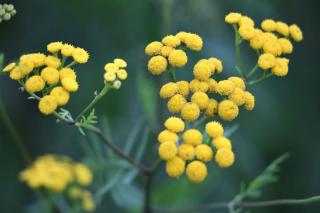 As for exposure, favor warm, sunny spots, and if possible, make sure it’s sheltered from cold drafts if ever your garden is prone to them. Finally, make note of the low hardiness of Helichrysum italicum , meaning you’ll have to plant this one in spring. Regarding the planting, normally one or two specimens of your curry plant will comfortably cover a square yard or meter.
As for exposure, favor warm, sunny spots, and if possible, make sure it’s sheltered from cold drafts if ever your garden is prone to them. Finally, make note of the low hardiness of Helichrysum italicum , meaning you’ll have to plant this one in spring. Regarding the planting, normally one or two specimens of your curry plant will comfortably cover a square yard or meter.
Once you’ve chosen the right spot:
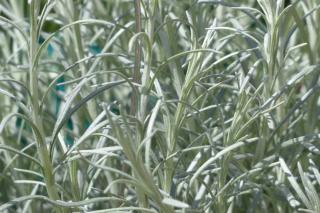 Potted Helichrysum italicum is a great idea. It doesn’t need very deep soil, but excellent drainage is required. Remember that the plant isn’t very hardy, but it will also easily sprout back from seed if you let them develop. Make sure a few fall to the ground in the pot.
Potted Helichrysum italicum is a great idea. It doesn’t need very deep soil, but excellent drainage is required. Remember that the plant isn’t very hardy, but it will also easily sprout back from seed if you let them develop. Make sure a few fall to the ground in the pot.
Help the plant resist a few degrees colder by protecting it with fleece or bringing it to shelter.
The curry plant doesn’t call for much care. It resists drought, so you won’t need to water it, and deadheading of wilted flower scapes and broken or damaged stems is only required in spring. Harsh winters should lead to protect the base of the plant with a thick layer of mulch.
Propagation of a specific Italian Everlasting specimen is typically done through semi-hardened cuttings, either at the end of spring or at the end of summer. What matters most is that the weather is warm at the start.
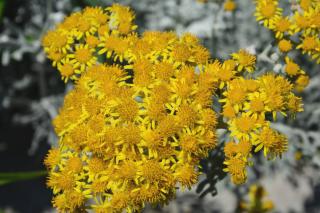 It’s pretty well established that pests are completely uninterested in foliage of Helichrysum italicum, but when it comes to diseases, it’s another thing altogether: in case of hot and wet summers, it’ll probably contract mildew. Leaves are the part that is mostly affected in this case, and it’s usually harmless for the plant’s health.
It’s pretty well established that pests are completely uninterested in foliage of Helichrysum italicum, but when it comes to diseases, it’s another thing altogether: in case of hot and wet summers, it’ll probably contract mildew. Leaves are the part that is mostly affected in this case, and it’s usually harmless for the plant’s health.
Did you know… ? Thanks to the high amount of essential oils, Helichrysum italicum is naturally protected against leaf-eating insects.
The curry plant comes in handy in a great many situations:
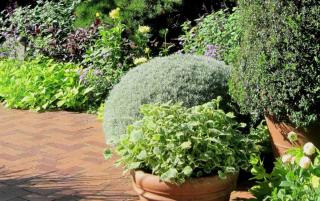 rock gardens;
rock gardens;For gardens that are planted in areas with harsher winters, plant Helichrysum italicum in flower beds as an annual. As for which companion plants are best for Italian Everlasting, the list is long: just select plants that can take the same growing environment, such as Sedum, Cystus, Gazania, French marigold, rudbeckia, etc.
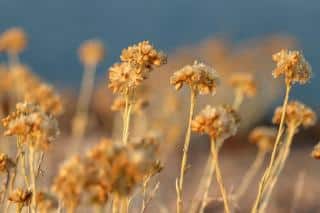 Helichrysum italicum is one of the favorites for people who love making dried flower bouquets.
Helichrysum italicum is one of the favorites for people who love making dried flower bouquets.
Its flowers will last for years and are perfect for decorating a beautiful piece of furniture.
For these projects, you can also grow hydrangea, bunny’s tail, goldenrod, poppy pods…